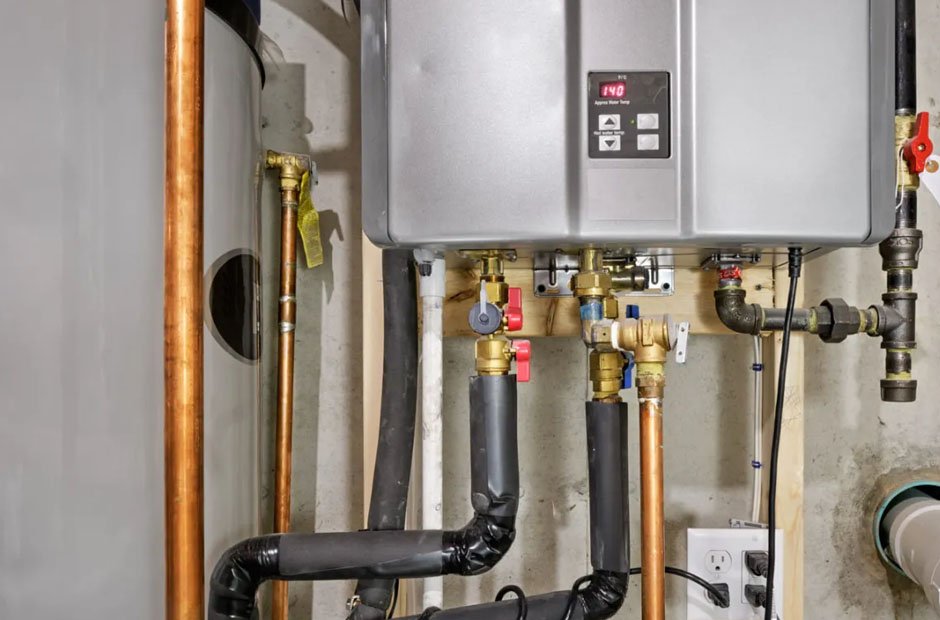A water heater is one of the most essential appliances in any household. Whether you’re taking a warm shower, washing dishes, or doing laundry, having a reliable hot water source is crucial. However, when it comes to selecting the best water heater, homeowners often find themselves torn between two main options: a traditional water heater (storage tank) and a tankless water heater (on-demand).
Each type has its advantages and drawbacks, making it important to choose wisely based on your household needs, budget, and lifestyle. In this guide, we’ll break down the key differences, pros and cons, cost factors, and their overall impact on your daily life. By the end, you’ll have a clear idea of which option suits your home best.
Understanding the Basics: Traditional vs. Tankless Water Heaters
Traditional Water Heater (Storage Tank)
A traditional water heater operates by heating and storing water in a tank, ensuring that hot water is available when needed. Here’s how it works:
- Water is heated and maintained at a set temperature inside the tank.
- When you turn on the tap, hot water is drawn from the tank, and it refills with cold water that is reheated.
- Common tank sizes range from 30 to 80 gallons, with larger tanks better suited for big families.
- The average lifespan is around 8 to 12 years with proper maintenance, such as flushing the tank to remove sediment buildup.
Tankless Water Heater (On-Demand)
A tankless water heater heats water only when needed, eliminating the need for a storage tank. Here’s how it works:
- Cold water passes through a heating element (electric or gas) when a tap is turned on.
- Since there’s no storage tank, it provides hot water on demand, reducing standby energy loss.
- Tankless models are compact and typically mounted on walls, making them ideal for small spaces.
- The average lifespan is around 20 years, but regular descaling is necessary to prevent mineral buildup.
Key Differences: Which One Fits Your Lifestyle?
Hot Water Supply and Usage
- Traditional Water Heater: Stores a large amount of hot water, but once the tank is empty, you have to wait for it to refill and heat up again.
- Tankless Water Heater: Provides endless hot water, but if multiple taps or appliances are in use simultaneously, it may struggle to keep up.
Energy Efficiency
- Traditional Water Heater: Continuously heats water, leading to standby energy loss and higher energy bills.
- Tankless Water Heater: Only heats water when needed, making it more energy-efficient. In fact, it can be 24-34% more energy-efficient for homes that use less than 41 gallons per day.
Space Requirements
- Traditional Water Heater: Requires a dedicated space, often installed in basements, garages, or utility rooms.
- Tankless Water Heater: Compact and mounted on walls, making it ideal for small apartments or condos.
Installation Complexity
- Traditional Water Heater: Easier to install with lower upfront costs.
- Tankless Water Heater: Requires modifications like gas line upgrades, venting, or electrical work, making installation more complex and costly.
Cost Comparison: Upfront Investment vs. Long-Term Savings
Purchase and Installation Costs
- Traditional Water Heater: Generally costs between $500 to $1,500, with installation costs ranging from $500 to $1,000.
- Tankless Water Heater: More expensive, with prices ranging from $1,000 to $3,000, and installation costs between $1,000 and $2,500.
Operating Costs and Energy Savings
- Traditional Water Heater: Higher energy bills due to constant reheating.
- Tankless Water Heater: Saves money in the long run due to lower energy consumption, potentially reducing energy costs by $100 or more per year.
Maintenance and Repair Costs
- Traditional Water Heater: Requires tank flushing and anode rod replacement to prevent corrosion.
- Tankless Water Heater: Needs periodic descaling to remove mineral buildup but generally has fewer major failures.
Choosing Based on Home Size, Climate, and Lifestyle Needs
- For Small Apartments or Condos: A tankless water heater is the best choice due to its space-saving design and efficiency.
- For Large Households with High Water Demand: A traditional water heater may be better unless you install multiple tankless units.
- For Eco-Conscious Homeowners: A tankless water heater is the greener option, reducing energy consumption and carbon footprint.
- For Cold Climates: Choose a tankless water heater with a high GPM (gallons per minute) flow rate to ensure adequate hot water supply in winter.
Common Myths and Misconceptions
“Tankless Water Heaters Provide Instant Hot Water”
Tankless heaters still take time to heat and deliver water. While they eliminate standby heat loss, they don’t provide hot water instantaneously.
“Traditional Water Heaters Are Always Inefficient”
Modern traditional water heaters come with insulation and smart controls that improve energy efficiency.
“Tankless Heaters Don’t Need Maintenance”
Regular descaling is necessary to prevent mineral buildup, especially in areas with hard water.
Expert Recommendations: Which One Is Right for You?
Who Should Choose a Traditional Water Heater?
- Homeowners looking for a lower upfront cost.
- Families with high daily water usage, needing a steady supply of hot water.
- Those who prefer simpler installation with minimal modifications.
Who Should Choose a Tankless Water Heater?
- Homeowners seeking long-term energy savings.
- Those with limited space who need a compact solution.
- Environmentally conscious individuals looking for an eco-friendly option.
Choosing the best water heater for your home depends on your budget, hot water usage, and space availability. A traditional water heater is more affordable upfront and provides a steady supply, while a tankless water heater is energy-efficient, saves space, and lasts longer.
Before making a decision, consider your household’s specific needs and consult a plumbing professional for expert guidance. With the right choice, you’ll enjoy reliable and efficient hot water for years to come!



